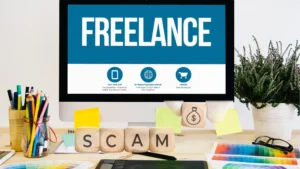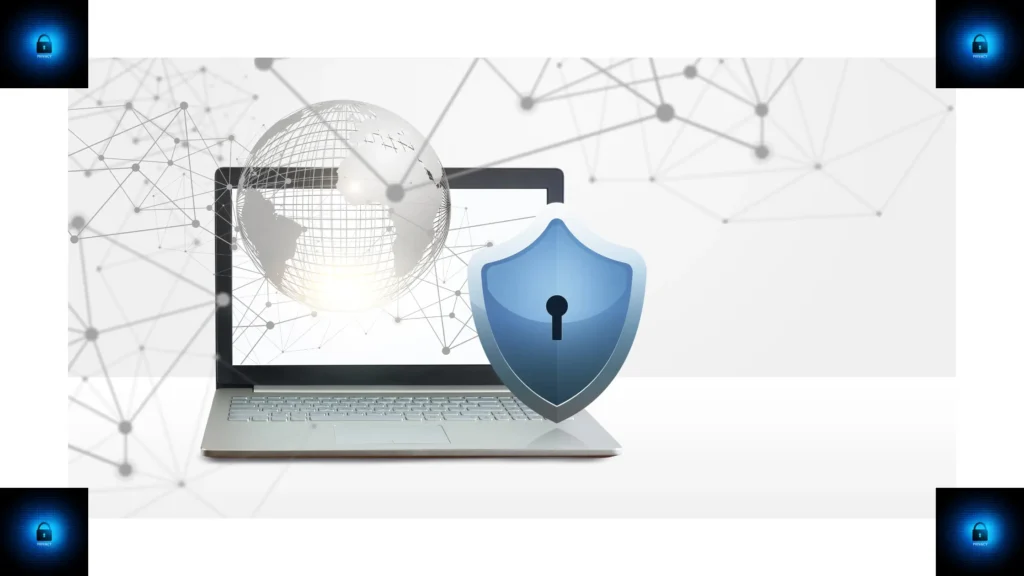The moment you decide to search for gigs online, opportunities and traps appear side by side. If you’re not careful, what looks like a financial breakthrough could be a risky venture unless you know how to avoid scams in freelance writing jobs.
In the freelancing world, not all opportunities are genuine, and that’s okay. You just need an eagle eye and a detective’s hat to spot the real ones.
With this blog post, you’ll learn all about how you can avoid scammy jobs, protect yourself, and confidently
build your freelance career. Let’s get started.
What are the red flags in freelance writing job offers?

I can’t possibly show you how to avoid scams in
freelance writing jobs online without sharing tell-tale signs of a fake listing. This is where your detective hat comes into play.
As scammers become more sophisticated in their disguises, here are common red flags in freelance writing job offers that can expose them.
1. Brands without an online presence
Freelance trust should be earned, not assumed. Be cautious about working with a brand that lacks an online presence.
We can overlook the absence of an official website since some small brands may not have one yet. However, a client without even a valid social media page or LinkedIn profile is clearly not legitimate.
Run as fast as your legs can carry you.
2. Job ads with grammatical errors
Jobs ads with grammar mistakes are red flags. If an ad looks sloppy, be cautious—most scammers don’t proofread their ads.
3. Unrealistic pay
Often, scammers advertise jobs with unrealistic pay. For example, a job offering $1,000 for a 300-word blog post clearly spells trouble.
Don’t accept such jobs out of greed without doing your due diligence.
Such offers are bait for freelancers.
Don’t click suspicious links, or you could be hacked.
4. Creating urgent deadlines
Sometimes, a client you’ve worked for can request submission earlier than expected in exchange for double pay. It’s understandable if you have an existing relationship with a client.
However, it’s a cause for concern if a client tags work as urgent from the start. From my experience as a freelancer, I know they don’t really need it that fast.
If anything, their aim is to make you panic and skip safety checks, such as verifying their profile and requesting a contract.
5. Refusing to sign contracts
One common warning sign of a freelance job scam is when clients refuse to sign a contract. Knowing that a contract is legally binding, anyone with an ulterior motive will shy away when you request one.
Sometimes, fake clients will change topics or insist on communicating outside the proper channels.
Succumbing to their tactics will ease their disappearance when the time comes and ultimately affect you in the end. That said, even for the cheapest gigs, don’t agree to ‘just keep it casual.’
6. Excessive communication
Legitimate clients know when and how to send their message across without any misunderstanding. With scammers, the case is different.
They bombard you with endless and, most of the time, unnecessary messages. If you are not careful, you may end up making the wrong decisions out of confusion.
7. Unclear job description
A serious client will not mince words on their expectations. Details about their requirements and payment will be crystal clear, with no room for confusion.
In contrast, a fake job offer will often fail to meet the mark. Even repeated reading leaves you more confused.
If, at first glance, you can’t understand a job ad, then look for another offer to avoid making a wrong choice.
8. Unfamiliar payment methods
Even on reputable freelance job sites, you can smell phishing clients from a mile away. First, they try to trick you into closing a deal off the platform.
For example, consider a scenario where a client offers a lucrative writing assignment but insists on discussing project details over a messaging app like WhatsApp or Telegram. After gaining your trust, the client requests payment via a popular third-party app that seems legit at first glance.
However, once you deliver the work, the payment never arrives, and they vanish without a trace. By falling for such a ploy, you lose the protections these platforms provide—but that won’t be the only thing you’ll lose.
You are likely to lose your work, personal info, and money to criminals online.
How do I protect myself as a freelancer?
We’ve established that freelance writing scams exist and also discovered how to identify them. Let’s discuss how to protect yourself.
Protecting yourself starts by understanding the scammer’s mindset. Just like wearing a seatbelt for safety, vigilance keeps you ahead of job scams.
As a
freelance writer, I’ve seen my fair share of shady listings. Still, the bumps don’t change the fact that freelancing is a profitable endeavor.
Now that you’re prepared, let’s move on to practical strategies to protect yourself as an online freelancer.
1. Maintain a written contract
Word of mouth is not enough. Texts aren’t enough. Before working with a new client, obtain a written contract to protect your rights.
A contract is a legal document that outlines the scope of work, payment terms, and deadlines. To further safeguard yourself, ensure your contract includes must-have clauses such as:
- Kill-fee terms: This guarantees payment if a project is canceled without notice.
- Scope-creep boundaries: These define what is included in the project and help prevent the addition of tasks without compensation.
- Late-payment penalties: which impose fees for delayed payments.
Keep these documents secure, as they may be needed in the event of a dispute.
2. Use freelancing platforms
They help screen clients and verify only those who meet the standard.
Imagine this: You’re working through a platform like Upwork. A client assigns you a task and places the payment into an escrow account.
This account serves as a neutral holding spot, ensuring both parties’ commitments are met. Once you deliver the completed work, the platform releases the funds from escrow and directly deposits them into your chosen account.
3. Document Transactions
Always keep records: invoices, receipts, chats, emails, and payment confirmations—no matter how minor.
If accused unfairly, your records protect you. Documentation also helps with filing taxes.

How to verify if a freelance client is legit online
Thinking of how to avoid scams in freelance writing jobs online? Start by ascertaining a client’s legitimacy.
Just like you can’t use a product without verifying the expiration date, you shouldn’t accept a job without checking a client’s history. Conduct a thorough background check.
Luckily, Google has got you covered, and most authentic brands operating in this age have a digital footprint. Type the brand or client’s name on Google.
Check their track records, employee reviews, and social media pages. Make sure to leave no stone unturned.
Verification may take time, but it’s your shield against scammers. Make it a non-negotiable habit to research every client before accepting a job—your safety and earnings depend on it.
These tools will help with your research
- Check employee reviews: Google Reviews, Trustpilot, Glassdoor.
- Research payment history: Upwork, Fiverr, Freelancer
- Confirm domain/email lookup: Hunter.io, Whois Lookup.
- Check the client or company profile and connections on LinkedIn, Instagram, or X.
Should I accept writing tests or samples for free?
Yes, you can, but don’t cross your limits. Know the line between a test and exploitation. Once in a while, you’ll find jobs that insist on a sample.
In fact, not all of them are deceitful. Some just want to see proof that you can actually deliver results.
This is a different ball game compared to clients who request multiple unpaid trial samples.
A better option is to create a portfolio with various samples within your niche and save it in a Google Drive, at the very least. With this, you can provide links to your portfolio instead of spending time proving your worth to clients.
What payment method protects freelance writers from scams?
Think of all the effort you put into freelance writing — from negotiating with clients to in-depth research, and down to execution. All this effort will be for nothing without getting your due payment.
Simply put, protecting your payment can guarantee you’re not cheated. Opt for secure payment channels, especially those that facilitate dispute resolution in the event of a misunderstanding.
I’ll always recommend platforms that use escrow systems. Platforms like Upwork, Fiverr, and Freelancer provide payment methods that protect you from scams.
Payment is usually withheld until both sides keep their end of the deal. By all means, avoid shady payment platforms.
For instance, Western Union, PayPal, or direct crypto platforms are convenient; however, the lack of dispute resolution encourages scammers to steal your work without stress.
Using these sites makes you vulnerable, and it won’t be long before issues arise.
What Should I Do if I’ve Been Scammed by a Freelance Writing Job?
First, don’t panic if you’ve been scammed. It happens to many beginners in the freelance writing world.
What you make of the experience determines how far you can sail. Will you dust yourself off and continue freelancing, or quit altogether?
If you plan on moving forward, having the right knowledge to tackle the situation makes recovery faster. That said, here are clear steps you can apply to recover and prevent future losses:
Cease communication with the scammer
The deed has been done. Don’t plead or try to engage the scammer more than you already have. You may end up throwing more logs on a burning bush.
File a report on the platform
This is a crucial step to take in order to recover your losses. Direct your complaints to the exact platform where you got scammed.
Retrieve any evidence of communication and agreement
Reputable freelancing platforms may require additional information to clear a dispute. Now is the time to find every proof of transaction you have. If you keep records, gather the necessary documents. Evidence of chat logs, contracts, and receipts will support your case.
Report to payment channels
Notify payment providers of phishing activities on their sites. This will help flag the thief in motion. With the right documents, you can even initiate a reversal before it’s too late.
Warn other freelancers
Share your experience with freelancers in your community. This will prevent more people from falling victim. Moreover, they can also offer tips to catch the scammer.
Strengthen your defense
Learn from your experience and prevent further damage.
Consider taking on a vetted micro-gig
A reliable task on a trusted platform, as a first step back into freelancing, will go a long way. This minor victory can help rebuild your confidence and make the emotional rebound easier.
Conclusion
Now, you know what to look out for. Always remember that wherever money flows online, scammers will follow naturally.
Therefore, if you master how to avoid scams in freelance writing jobs and lean on your instincts, you will remain untouchable. Whether you’re a beginner or an experienced freelancer, take these measures as a guide to safe freelancing.




